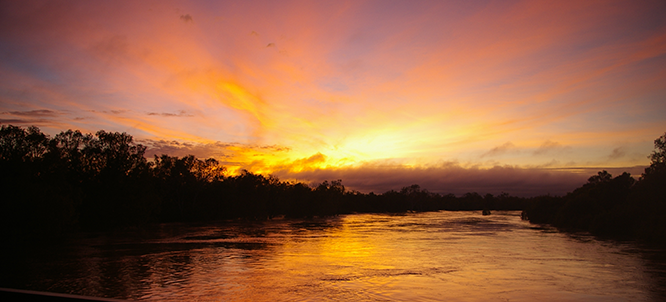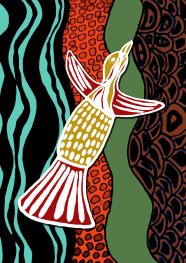
HDR Student Presentations
Loading...
Presentation Type
Presentation
Location
The University of Notre Dame Australia Broome Campus
NDB11/ Lecture Room 13
Start Date
23-9-2022 12:00 PM
End Date
23-9-2022 1:00 PM
Description
This research explores the intersections between Indigenous-led tourism and resurgence among Indigenous communities, with resurgence understood as connections with culture, Country (i.e. Indigenous homelands and waterways), and community. The research utilises a comparative case study approach to specifically highlight the experience of Karajarri Traditional Owners within the context of the saltwater Kimberley region of northwestern Australia. It also presents a comparative example of Indigenous-led tourism development within the context of the author’s Tribal Nation, the Cherokee Nation of Oklahoma, in the United States. Employing an Indigenous Participatory Action Research methodological framework that prioritises Indigenous perspectives, relationality and collaboration with participants as co-researchers, the research relies on extended, semi-structured interviews and co-researcher feedback when presenting the data. This study brings forth different voices, perspectives and experiences with Karajarri-led tourism from Aboriginal and non-Aboriginal co-researchers alike. The research focuses specifically on the relationships between traditional values, cultural lifeways and tourism models offered to visitors.
Overall, the study critically examines the nexus between Indigenous-led tourism and community resurgence practices and discourses, with an emphasis on the ways that tourism relates to and, in some cases, serves as a vehicle for enabling resurgence. Specifically, I examine the ways that the Karajarri case study relates to the following concepts from Indigenous resurgence discourses: (1) grounded normativity, or traditional, place-based values; (2) ‘everyday acts’ of resurgence of cultural lifeways in the spheres of permissions, governance and economy-making; and (3) Indigenous internationalism that introduces a comparative lens for bringing the Karajarri case into dialogue with Cherokee and other Indigenous-led tourism models. The reflections from this study highlight the ways that Indigenous-led tourism can serve as a vehicle for resurgence of culture, community and connections with Country. It also explores the ways that this tourism-resurgence nexus is tested and shaped by the wider context of settler-colonial historical, political, social and economic influences, whether in the Kimberley or Oklahoma Indian Country.
Recommended Citation
Bigby, Bobbie Chew, "Tourism Trails from Saltwater Kimberley to Oklahoma Indian Country: An Exploration of Indigenous-led Tourism, Culture and Resurgence" (2022). Workshops and Presentations. 3.
https://researchonline.nd.edu.au/nulungu_workshops_presentations/HDR/schedule/3
Tourism Trails from Saltwater Kimberley to Oklahoma Indian Country: An Exploration of Indigenous-led Tourism, Culture and Resurgence
The University of Notre Dame Australia Broome Campus
NDB11/ Lecture Room 13
This research explores the intersections between Indigenous-led tourism and resurgence among Indigenous communities, with resurgence understood as connections with culture, Country (i.e. Indigenous homelands and waterways), and community. The research utilises a comparative case study approach to specifically highlight the experience of Karajarri Traditional Owners within the context of the saltwater Kimberley region of northwestern Australia. It also presents a comparative example of Indigenous-led tourism development within the context of the author’s Tribal Nation, the Cherokee Nation of Oklahoma, in the United States. Employing an Indigenous Participatory Action Research methodological framework that prioritises Indigenous perspectives, relationality and collaboration with participants as co-researchers, the research relies on extended, semi-structured interviews and co-researcher feedback when presenting the data. This study brings forth different voices, perspectives and experiences with Karajarri-led tourism from Aboriginal and non-Aboriginal co-researchers alike. The research focuses specifically on the relationships between traditional values, cultural lifeways and tourism models offered to visitors.
Overall, the study critically examines the nexus between Indigenous-led tourism and community resurgence practices and discourses, with an emphasis on the ways that tourism relates to and, in some cases, serves as a vehicle for enabling resurgence. Specifically, I examine the ways that the Karajarri case study relates to the following concepts from Indigenous resurgence discourses: (1) grounded normativity, or traditional, place-based values; (2) ‘everyday acts’ of resurgence of cultural lifeways in the spheres of permissions, governance and economy-making; and (3) Indigenous internationalism that introduces a comparative lens for bringing the Karajarri case into dialogue with Cherokee and other Indigenous-led tourism models. The reflections from this study highlight the ways that Indigenous-led tourism can serve as a vehicle for resurgence of culture, community and connections with Country. It also explores the ways that this tourism-resurgence nexus is tested and shaped by the wider context of settler-colonial historical, political, social and economic influences, whether in the Kimberley or Oklahoma Indian Country.





Comments
Please click download for flyer and Biography